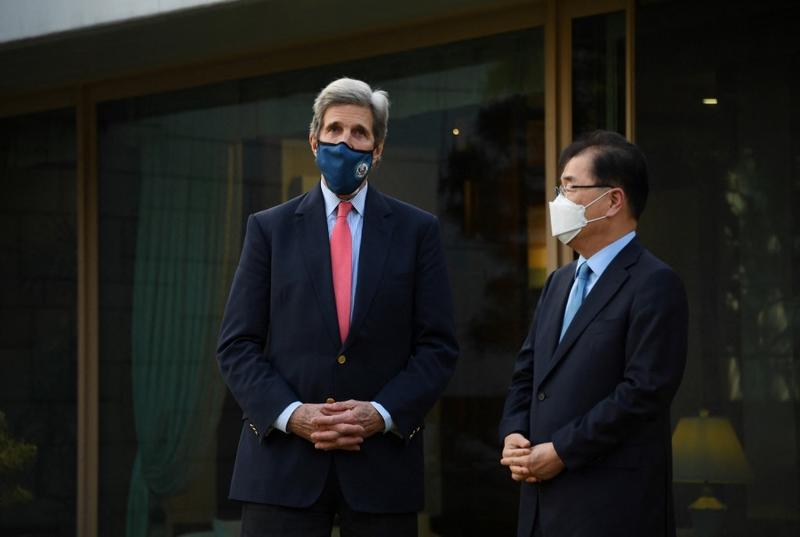 This handout photo taken on April 17, 2021 and provided by the US embassy in South Korea shows US Special Presidential Envoy for Climate John Kerry (left) talking with South Korean Foreign Minister Chung Eui-yong (right) before their dinner meeting at Chung's official residence in Seoul. (HANDOUT / US EMBASSY IN SOUTH KOREA / AFP)
This handout photo taken on April 17, 2021 and provided by the US embassy in South Korea shows US Special Presidential Envoy for Climate John Kerry (left) talking with South Korean Foreign Minister Chung Eui-yong (right) before their dinner meeting at Chung's official residence in Seoul. (HANDOUT / US EMBASSY IN SOUTH KOREA / AFP)
South Korea raised concerns over Japan's decision to release contaminated water from its crippled Fukushima nuclear plant into the sea with visiting US climate envoy John Kerry, its foreign ministry said, but Kerry reaffirmed Washington's confidence in the plan's transparency.
Kerry arrived in Seoul on Saturday to discuss international efforts to tackle global warming on a trip that included a stop in China ahead of President Joe Biden's virtual summit with world leaders on climate change on April 22-23.
US climate envoy John Kerry arrived in Seoul on Saturday to discuss international efforts to tackle global warming
South Korean Foreign Minister Chung Eui-yong sought to rally support behind the country's protest against the Fukushima plan at a dinner meeting with Kerry, the ministry said. Under the plan, more than 1 million tonnes of water will be discharged from the plant wrecked by an earthquake and tsunami in 2011 into the nearby sea off Japan's east coast.
Seoul strongly rebuked the decision, with the foreign ministry summoning the Japanese ambassador and President Moon Jae-in ordering officials to explore petitioning an international court.
ALSO READ: The world must pressure Japan to change decision on Fukushima water
"Minister Chung conveyed our government and people's serious concerns about Japan's decision, and asked the US side to take interest and cooperate so that Japan will provide information in a more transparent and speedy manner," the ministry said in a statement.
But Kerry, at a media roundtable on Sunday, said Tokyo had made the decision in a transparent manner and will continue following due procedures.
"The United States is confident that the government of Japan is in very full consultations with the IAEA," he said, referring to the International Atomic Energy Agency.
"The IAEA has set up a very rigorous process and I know that Japan has weighed all the options and the effects and they've been very transparent about the decision and the process."
ALSO READ: Pacific Islands join calls for Japan to 'rethink' nuclear water dump
The South Korean foreign ministry said Chung and Kerry also agreed to work together to boost international cooperation to achieve carbon neutrality by 2050, a goal pledged by South Korea, Europe and others.
Kerry told the roundtable that Biden aims to urge countries to commit to more ambitious greenhouse gas emissions targets such as by revamping their power initiatives or speeding up transitions to renewable energy.
The United States is expected to announce its own new emissions target for 2030 this week.
"I think Korea has set an ambitious target and Korea is trying to do a lot, it's not easy for any country," Kerry said. "We need to be smarter, so do I think it’s possible for additional steps? I do think there are some things that could happen."
READ MORE: Catering and retail recoil at Japan's water move impact


